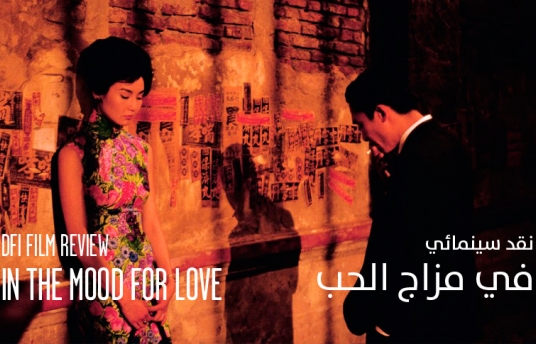DFI Film Review: In the Mood for Love (2000)
Sep 05, 2011

Written by Reem Saleh, New Media, DFI
Film: Fa yeung nin wa (In the Mood for Love)
Year: 2000
Director: Wong Kar-wai
Stars: Tony Leung Chiu Wai, Maggie Cheung and Ping Lam Siu
Genre: Drama, Romance
‘In the mood for love’ forms the second part of director Wong Kar-wai’s trilogy, along with ‘Days of Being Wild’ ‘2046. Together, the series is a reflection on time, memory and relationships.
‘In the mood for love’ takes us to the heart of Hong Kong in the early 1960’s, when two neighbors move the same day into a very busy building. Mrs. Chan and Mr. Chow develop a friendly relationship, which becomes more significant when they discover that their respective spouses are cheating on them, with each other. The new friends try to understand how this has happened, and commit together to address their unfaithful partners. From the shared pain of adultery, a unique bond grows between them, along with a story that has become one of Asia’s most unforgettable pictures. The film leaves you with a feeling of enchantment, typical of films by one of the century’s most memorable directors Wong Kar-wai.
Wong Kar-wai brings to ‘Fa yeung nin wa’ (In the Mood for Love) all the elegance of Hollywood’s golden age of the 1940’s. The film is mostly inspired, however, by French impressionism in cinema. In line with this tradition, it is filled with close-ups, camera movements, minimal usage of lighting, the use of shadows to suggest action outside of the frame, and reflections giving heightened effects to the smallest of details. The film features many clichés: umbrellas in the street, two lovers and slow motion…but somehow these scenes are crafted meticulously, to create a unique effect, and a fresh appeal.
The film is a combination of portraits. It tells a charming love story supported by the magic of composing colors and frames with a careful consideration of all the slightest fine points. Scenes are shot in photo portrait-like frames with montages both fast and slow. Both protagonists are usually found eating alone, avoiding others who remain mostly off screen. The shots of narrow hallways and staircases highlight a sense of claustrophobia, and accentuate the alienation of these characters, that prevails regardless of their physical proximity to others. The plot is developed aesthetically, and is emotionally supported by the repetition of the sublime theme song, composed by Shigeru Umebayashi and Michael Galasso. This music along with the eccentric visual rhythms of the film, condition us to feel the unspoken desires of a couple fighting a longing to be together, while tempted by frequent coincidence, as if they are meant for each other.
Mrs. Chan, in particular, is shot beautifully. The audience sees her the way she is viewed by her neighbor. Even the way she leans her head gracefully carries suppressed feelings. She manages to combine the betrayed, lonely and subtly sensual woman. Dialogue becomes trivial and is replaced by suggestive body language, long and profound eye contact, and delicate breathing. This is the language that reveals the couple’s inner thoughts.
Life amidst resentment, denial, and anger draws a reflection on desire and inhibition. They say in the film “we don’t want to be like them”. “Them”, their spouses, the catalysts of all the pain, are the emotional centerpiece of the film…but their actual faces are never revealed. These central figures are always placed off screen, stressing the distance between the protagonists and their spouses. The story is told as if the director is giving us the choice to add the person we wish…or we fear…to this cruel part. This makes these characters more resonant, and more personal to anyone who’s lived through similar deceptions. And the film leaves us with questions: would the cheated couple engage in an affair with each other? Would they become a double of their spouses? If they did, would they be justified in these actions? This is for the viewer to wonder.
Wong Kar-wai merges a simple story with a complex technical achievement, creating a masterpiece of cinema in the process. ‘In the Mood For Love’ displays an exceptional aesthetic refinement that goes far beyond a mere homage to expressionism and Hollywood, while keeping intact some relics from the past. This stylized romantic film addresses relationships from a distance, but an intimate distance that could be better described as eloquence and class, like the morals of the period.
The film gathered more than 30 awards at international film festivals including two wins in Cannes for Best Actor and Technical Grand Prize. It was also nominated for the prestigious Palme D’or. Fa yeung nin wa (In the Mood for Love) is a mix of taste, intellect and talent, and it is one of the most delicate love stories of the century.
In the Mood for Love - Trailer
إعلان فيلم 'في مزاج الحب'